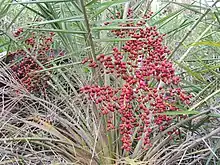| Ceylon date palm | |
|---|---|
 | |
| A fruiting specimen of P. pusilla at Guindy National Park in Chennai | |
| Scientific classification | |
| Kingdom: | Plantae |
| Clade: | Tracheophytes |
| Clade: | Angiosperms |
| Clade: | Monocots |
| Clade: | Commelinids |
| Order: | Arecales |
| Family: | Arecaceae |
| Genus: | Phoenix |
| Species: | P. pusilla |
| Binomial name | |
| Phoenix pusilla | |
Phoenix pusilla (pusilla, Latin: tiny or weak), the Ceylon date palm or flour palm,[1] is a species of flowering plant in the palm family, native to southern India and Sri Lanka (formerly Ceylon). They are found in lowlands, ridges and on hills. No taller than 5 m, this species is usually single-stemmed but clumps do occur naturally. At 25 cm in diameter, the trunks are covered with distinct leaf-base scars, forming a 'wicker' pattern. Their distinguishable trunks have made them popular in cultivation. They are drought tolerant and slow-growing.
References
Wikimedia Commons has media related to Phoenix pusilla.
- ↑ "Phoenix pusilla". Germplasm Resources Information Network. Agricultural Research Service, United States Department of Agriculture. Retrieved 18 April 2021.
- Riffle, Robert L. and Craft, Paul (2003) An Encyclopedia of Cultivated Palms. Portland: Timber Press. ISBN 0-88192-558-6 / ISBN 978-0-88192-558-6 (page 403)
- http://www.pacsoa.org.au/palms/Phoenix/pusilla.html
- Nucleated succession by an endemic palm Phoenix pusilla enhances diversity of woody species in the arid Coromandel Coast of India
- http://www.palmworld.org/palmworld-Phoenix-pusilla.html
This article is issued from Wikipedia. The text is licensed under Creative Commons - Attribution - Sharealike. Additional terms may apply for the media files.